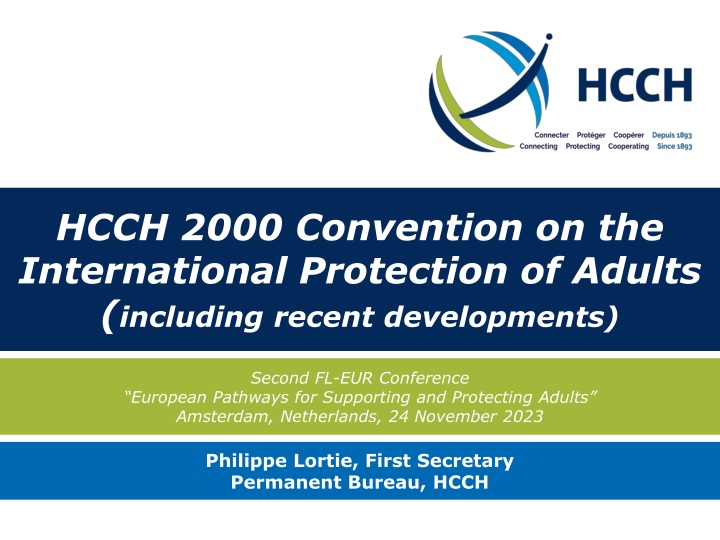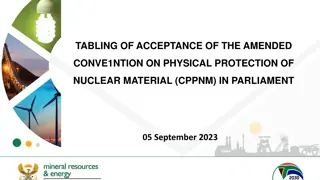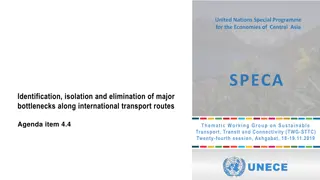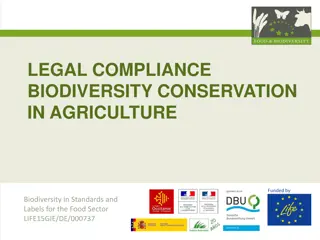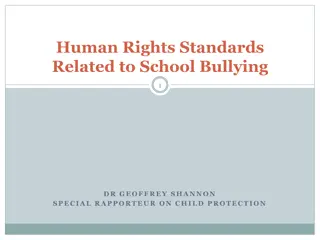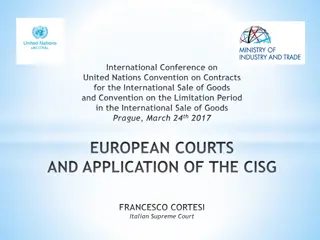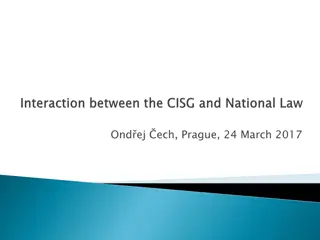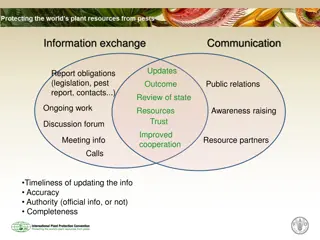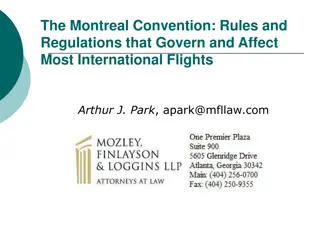International Protection of Adults Convention Overview
This content provides an overview of the HCCH 2000 Convention on the International Protection of Adults, including recent developments, cross-border statistics, examples of support, and key principles such as respecting adult dignity and autonomy. The convention aims to safeguard vulnerable adults' interests in international scenarios where they may lack the capacity to protect themselves.
Download Presentation

Please find below an Image/Link to download the presentation.
The content on the website is provided AS IS for your information and personal use only. It may not be sold, licensed, or shared on other websites without obtaining consent from the author.If you encounter any issues during the download, it is possible that the publisher has removed the file from their server.
You are allowed to download the files provided on this website for personal or commercial use, subject to the condition that they are used lawfully. All files are the property of their respective owners.
The content on the website is provided AS IS for your information and personal use only. It may not be sold, licensed, or shared on other websites without obtaining consent from the author.
E N D
Presentation Transcript
HCCH 2000 Convention on the International Protection of Adults (including recent developments) Second FL-EUR Conference European Pathways for Supporting and Protecting Adults Amsterdam, Netherlands, 24 November 2023 Philippe Lortie, First Secretary Permanent Bureau, HCCH
SOME CROSS-BORDER STATISTICS Approximately 3.4% of the world s population lives in a State other than that in which they were born (over 258 million individuals). In 2017, 48% were women. There are more women than men migrants in Europe, North America, Oceania, Latin America and the Caribbean. Women now constitute the majority of immigrants in global North countries, a situation due in part to ageing of the immigration population, as women tend to live longer than men. In 2020, 3.3% of EU citizens aged 18-64 resided in an EU Member State other than that of their citizenship (over 8 million individuals). These statistics, combined with, e.g., the dementia statistics we know, call for the cross-border support of vulnerable persons.
HCCH 200O PROTECTION OF ADULTS CONVENTION The 2000 Convention applies to the protection in international situations of adults who, by reason of an impairment or insufficiency of their personal faculties, are not in a position to protect their interests (Art. 1)
CROSS-BORDER SUPPORT - EXAMPLE Contracting State B Contracting State A X spends her winters in State B where her daughter Y and familly habitually reside X habitually resides in State A where she has all her assets X moves from State A to State B Power of representation While in State B, X s dementia reaches a point where she needs special 24/7 support. She will remain in State B. Assets in State X will need to be sold in order to pay for the special 24/7 support in State B. Daughter Y will exercise the Power of Representation. Power of representation => =>
HCCH 200O PROTECTION OF ADULTS CONVENTION IN SHORT 2000 Conventiongives effect to Article 12 of 2006 UNCRPD 2000 Convention and 2006 UNCRPD are complimentary 2000 Convention supports vulnerable adults in exercising their legal capacity across borders 2000 Convention affirms that the respect for the adult dignity and autonomy are to be primary considerations 2000 Convention affirms the respect for the rights, will and preferences of vulnerable adults
DEVELOPMENTS SINCE THE FIRST FL-EUR CONFERENCE IN 2021 First meeting of the Special Commission on the 2000 Convention,9-11 November 2022 [See C&Rs] 2000 Convention Practical Handbook 2000 Convention Country Profile 2000 Convention Implementation Checklist Extension of the IHNJ to the 2000 Convention 2000 Convention possible amendments Guardianship and Curatorship => NO Ex lege representation => NO Instructions and wishes made => NO Extension to REIOs => NO
200O CONVENTION A PRIVATE INTERNAITONAL LAW INSTRUMENT Avoids conflicts between legal systems of the Contracting Parties by providing: Jurisdiction rules only one competent authority can have jurisdiction at a time on a specific subject matter Applicablelaw rules applicable law will have a real and substantial connection to the incapacitated adult and / or his / her property (i.e., limited possibilities to contest) Powers of representation granted in one Contracting Party will be given effect in another Recognition & enforcement rules - measures taken in one Contracting Party will be recognised and enforced in another Enhance co-operation between Contracting Parties Provides for party autonomy in relation to jurisdiction and applicable laws with a real and substantial connection (i.e., presumed to be known to the adult)
SCOPE BROAD RANGE OF PROTECTION MEASURES, BUT NOT LIMITED TO The determination of incapacity and the institution of a protective regime; The placing of the adult under the protection of a judicial or administrative authority; Guardianship, curatorship and analogous institutions; The designation and functions of any person or body having charge of the adult's person or property, representing or assisting the adult; The placement of the adult in an establishment or other place where protection can be provided; The administration, conservation or disposal of the adult's property; The authorisation of a specific intervention for the protection of the person or property of the adult.
JURISDICTION RULES Primary general jurisdiction => habitual residence (Art. 5) Primary general jurisdiction => refugee, displaced person or impossible to establish habitual residence (Art. 6) Concurrent subsidiary general jurisdiction => nationality (Art. 7) Concurrent subsidiary limited jurisdiction => location of the property of the adult (Art. 9) Concurrent subsidiary limited (urgency) jurisdiction => presence of the adult or location of their property (Art. 10) Concurrent subsidiary limited jurisdiction - measures compatible with those already in place => presence of the adult (Art. 11) Transfer of jurisdiction & Party autonomy (Art. 8)
OTHER JURISDICTIONS FOR THE PURPOSE OF TRANSFER Other forafor the purpose of transfer of jurisdiction (Art. 8): A State of which the adult is a national (Art. 8(2)(a)) The State of the preceding habitual residence of the adult (Art. 8(2)(b)) A State in which property of the adult is located (Art. 8(2)(c)) The State whose authorities have been chosen in writing by the adult to take measures directed to his or her protection (Art. 8(2)(d)) The State of the habitual residence of a person close to the adult prepared to undertake his or her protection (Art. 8(2)(e)) The State in whose territory the adult is present, with regard to the protection of the person of the adult (Art. 8(2)(f))
JURISDICTION RULES SPECIAL COMMISSION DEVELOPMENTS Complete and close system One competent authority at a given time over a specific matter [C&Rs 8-9] Change of habitual residence (Art. 5(2)) Former habitual residence may continue to exercise jurisdiction under other grounds (e.g., Art. 7) [C&Rs 10-11] Jurisdiction based on nationality in the case of a multi-unit State (Arts 7 and 45(d)) [C&R 12] Additional explanations regarding party autonomy (Art. 8(2)(d)) and transfer of jurisdiction [C&Rs 13-14] Coordination of jurisdiction issues & the use of direction judicial communications[C&Rs 15-17] Extension of the International Hague Network of Judges (IHNJ) and the Emerging Guidance on Direct Judicial Communications to the 2000 Convention [C&Rs 56-60]
APPLICABLE LAW RULES Law applicable to measures of protection Authorities apply own law in exercising jurisdiction (Art. 13(1)) Exceptionally, the law of another State with a substantial connection to the case may be applied or considered (Art. 13(2)) Conditions of application of the measure The implementation of a measure taken by one Contracting State but implemented in another is governed by the law of that other State (Art. 14) Other applicable law rules Protection of third parties (Art. 17) Universal character of the conflicts rules (Art. 18) Exclusion of renvoi (Art. 19) Laws of mandatory application (Art. 20) Public policy exception (Art. 21)
POWERS OF REPRESENTATION & APPLICABLE LAW Like a contract powers of representation are given effect through the applicable law The law applicable to powers of representation (e.g., mandat de protection future, mandat d incapacit , Vorsorgevollmacht) granted by an adult, either under an agreement or by a unilateral act, to be exercised when such adult is not in a position to protect his or her interests, is governed by the 2000 Convention (Art. 15(1))
POWERS OF REPRESENTATION & APPLICABLE LAW The existence, extent, modification and extinction of powers of representation are governed by the: - law of the State of the adult's habitual residence at the time of the agreement or act (Art. 15(1)), or - by the following laws of the following States if designated expressly in writing (party autonomy): A State of which the adult is a national (Art. 15(2)(a)) The State of a former habitual residence of the adult (Art. 15(2)(b)) A State in which property of the adult is located, with respect to that property (Art. 15(2)(c)) Powers of representation can be withdrawn or modified, under certain conditions, taking into consideration to the extent possible the law referred to in Article 15 (Art. 16)
GIVING EFFECT TO POWERS OF REPRESENTATION The authorities of the Contracting State where a measure of protection has been taken or a power of representation confirmed may deliver to the person entrusted with protection of the adult's person or property, on request, a certificate indicating the capacity in which that person is entitled to act and the powers conferred (Art. 38(1)) The capacity and powers indicated in the certificate are presumed to be vested in that person as of the date of the certificate, in the absence of proof to the contrary (Art. 38(1)) Each Contracting State shall designate the authorities competent to draw up the certificate (Art. 38(1))
APPLICABLE LAW RULES SPECIAL COMMISSION DEVELOPMENTS Impact of changed circumstances on existing measures (Arts 13 & 14) Measures taken under Articles 5 to 9 remain in force even when the original ground of jurisdiction ceased to exist - implementation of the measure takes place in accordance with the law of the State of implementation [C&Rs 18-20] Ex lege representation fall under the scope and object of the Convention (Art. 1) and can be the subject of cooperation between Central Authorities (Chap. V) [C&Rs 21-22] Instructions given and wishes made by the adult e.g., advance directives fall under the scope and object of the Convention (Art. 1) and can be the subject of cooperation between Central Authorities (Chap. V) [C&Rs 23-26] Party autonomy Utility of aligning the choice of forum (Art. 8(2)(d)) with the choice of law (Art. 15(2)) [C&R 27]
RULES ON RECOGNITION & ENFORCEMENT OF MEASURES Measures taken in another Contracting State are to be recognised by operation of law (Art. 22(1)) An interested party may request a declaration of enforceability for a measure taken in another Contracting State (Art. 25(1)) Recognition (Art. 22(2)) or enforcement (25(3)) of a measure may be refused, if: The Convention grounds for jurisdiction were not complied with (Art. 22(2)(a)) The adult was not provided the opportunity to be heard (Art. 22(2)(b)) This would conflict with public policy or mandatory law (Art. 22(2)(c)) The measure is incompatible with a later measure taken in a non- Contracting State which would have had jurisdiction (Art. 22(2)(d)) A decision to place an adult in an establishment (where protection can be provided) in another Contracting State has not been made in consultation with that State (Art. 22(2)(e))
RULES ON RECOGNITION & ENFORCEMENT SPECIAL COMMISSION DEVELOPMENTS Measures shall be recognised by operation of law (Art. 22(1)) Measures such as the designation of an individual to represent or assist the adult are recognised automatically without the need for enforcement [C&Rs 28-29] Opportunity of the adult to be heard (Art. 22(2)(b)) Incorporate in the decision a record whether the adult was heard and, if not, reasons why the adult was not heard [C&R 30] Preventive action for recognition or non-recognition - advance recognition (Art. 23) [C&R 31] Simple and rapid procedure for declaration of enforceability or registration (Art. 25) Time frames, specialised authorities, concentration of jurisdiction [C&R 27] Enforcement in accordance with the law of the requested State (Art. 27) Differentiate between those measures that require enforcement and those that do not [C&Rs 33-35]
CENTRAL AUTHORITY COOPERATION FRAMEWORK Contracting States each designate a Central Authority (Art. 28). Functions of the Central Authorities Co-operate with each other (Art. 29(1)) Share information on the national laws and services available in their State for the protection of adults (Art. 29(2)) Facilitate communication amongst competent authorities (Art. 30) Discover the whereabouts of an adult (Art. 30) Encourage mediation to achieve agreed solutions (Art. 31) Assistance with the cross-border placement of an adult (Art. 33)
CENTRAL AUTHORITY SPECIAL COMMISSION DEVELOPMENTS Central Authorities should be given a mandate which is sufficiently broad, qualified personnel and resources, including modernmeans of communication [C&R 36] General obligation of Central Authorities to cooperate with each other (Art. 29) In addition to cooperating in relation to matters provided for under Articles 30 to 34, Central Authorities are also strongly encouraged to cooperate regarding other matters, under Article 29, to achieve the purposes of the 2000 Convention [C&R 41] Confirmation of powers of representation (Art. 38(1)) Confirmation of powers of representation must give every guarantee of reliability [C&R 42] Confirmation of powers of representation (Art. 38(1)) To be confirmed, powers of representation must be in force and in conformity with the law applicable [C&R 43]
WHERE DO WE STAND? Ratifications (EIF) (15) Signatures (5) Austria (2014) Ireland (2008) Belgium (2021) Italy (2008) Cyprus (2018) Luxembourg (2008) Czech Republic (2012) Netherlands (2000) Estonia (2011) Poland (2008) Finland (2011) France (2009) Germany (2009) Greece (2022) Latvia (2018) Malta (2023) Monaco (2016) Portugal (2018) Switzerland (2009) UK Scotland (2009)
LOOKING FORWARD TO MORE CONTRACTING STATES JOINING THE 2000 CONVENTION!
Philippe Lortie pl@hcch.nl www.hcch.net
